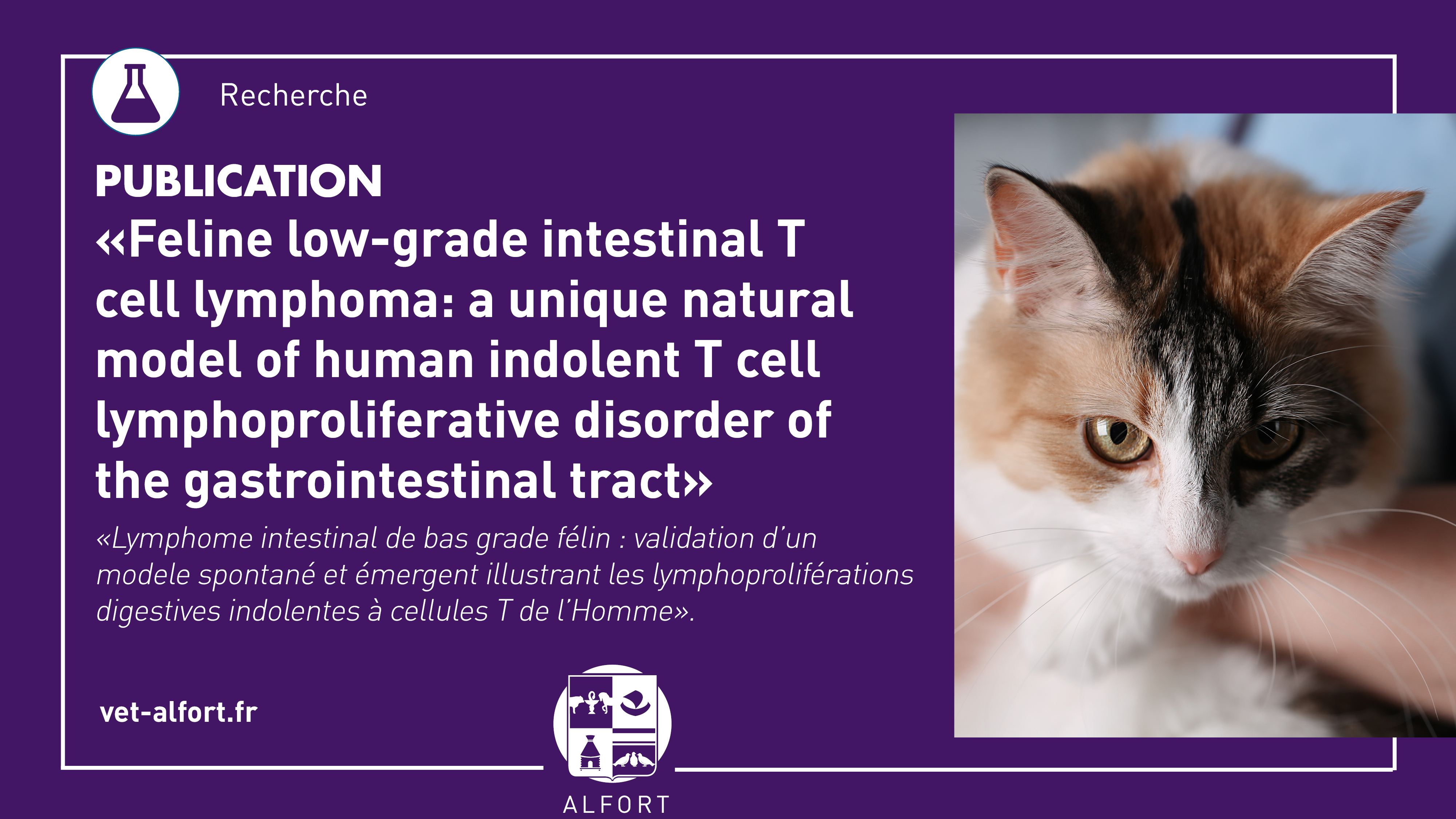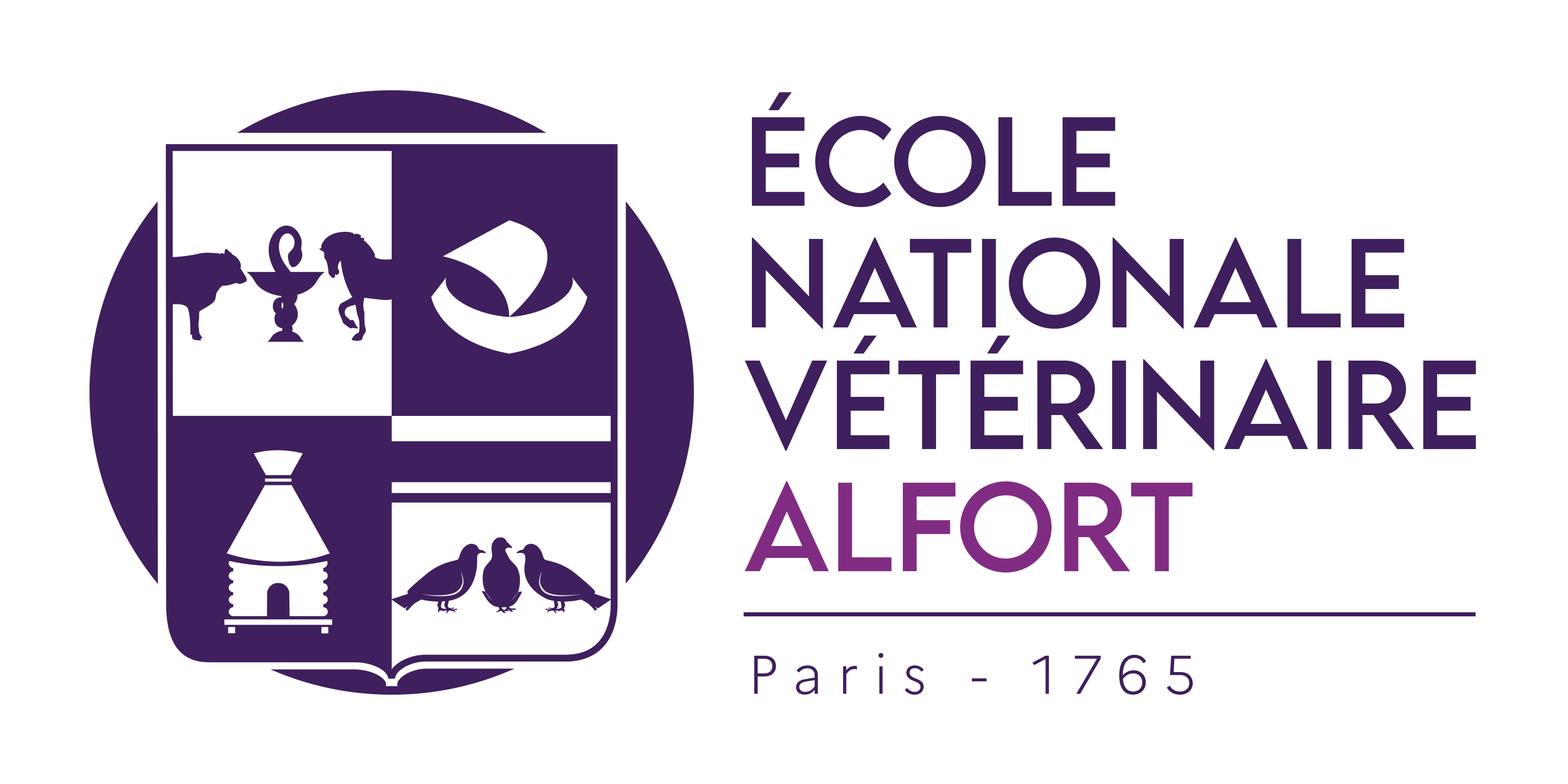Une publication co-signée par des vétérinaires et enseignants-chercheurs de l'EnvA, dans Laboratory Investigation, s'intéresse au lymphome intestinal de bas grade félin, un cancer fréquent chez le chat.
Le lymphome de bas grade est un cancer digestif émergent dont l'incidence devient préoccupante chez le chat. Il s'agit d'une maladie grave qui peut engager le pronostic vital de l'animal. Une publication* vient éclairer sa prise en charge et valide cette maladie féline comme un modèle animal spontané de la même maladie chez l'Homme.

Résumé
Lymphome intestinal de bas grade félin : validation d’un modele spontané et émergent illustrant les lymphoproliférations digestives indolentes à cellules T de l’Homme
Les lymphoproliférations à cellules T du tractus gastro-intestinal (GI-TLPD) sont des lymphomes T rares chez l’Homme pour lesquels aucun consensus thérapeutique n’est établi. Par ailleurs, une lymphoprolifération digestive indolente à cellules T (T-LGIL) émergente est décrite dans l’espèce féline. La physiopathologie de ces entités est mal définie. Dans un premier temps, nous avons prospectivement analysé des prélèvements lésionnels chez 22 chats présentant un T-LGIL sur les plans clinique, paraclinique, histopathologique et moléculaire. Nos résultats valident que ce modèle animal est pertinent pour l’étude de la maladie humaine. Dans l’autre partie du travail, notre objectif a été l’identification de critères discriminant les lymphoproliférations indolentes félines des entérites lymphoplasmocytaires, ce diagnostic différentiel étant un défi chez le chat. Nous avons établi de nouveaux critères histologiques
et immunohistochimiques. Un modèle de lymphomagenèse a été proposé : il repose sur un continuum entre une entéropathie inflammatoire chronique et l’émergence de clones néoplasiques T au sein de la muqueuse intestinale.
>>> Téléchargez l'article complet publié par l'Académie vétérinaire de France
Abstract
Feline low-grade intestinal T cell lymphoma: a unique natural model of human indolent T cell lymphoproliferative disorder of the gastrointestinal tract
Indolent T cell lymphoproliferative disorder (LPD) of the gastrointestinal tract (GI-TLPD) is a rare human primary gastrointestinal T cell lymphoma that was recently included in the 2016 revision of the World Health Organization classification of lymphoid neoplasms. Low-grade intestinal T cell lymphoma (LGITL), an emerging disease in the domestic cat, shares a number of features with human GI-TLPD. In this prospective study, we determined whether feline LGITL might serve as a model of human GI-TLPD. We analyzed clinical, laboratory, and radiological data and performed histopathological and molecular studies on small intestinal biopsies from 22 domestic cats diagnosed with LGITL. This cancer mostly affects aging cats, is associated with nonspecific gastrointestinal tract signs, and is usually characterized by an indolent course. A histopathological analysis indicated that LGITL was mainly located in the jejunum. The small intestinal lamina propria was infiltrated by large numbers of small CD3+ T cell lymphocytes with various CD4 and CD8 expression profiles (CD4+ CD8− (4 out of 11, 36%), CD4− CD8+ (3 out of 11, 27%), and CD4− CD8− (4 out of 11, 36%)). Intraepithelial lymphocyte (IEL) counts were elevated in all cases. Ki67 was expressed in lamina propria lymphocytes and IELs at a low level (<30%). Most LGITLs were labelled by antibodies against phosphorylated STAT5, but were negative for CD56 and phosphorylated STAT3. T cell receptor gamma chain gene monoclonality was found in 86% of cases. These findings confirmed that feline LGITL shares clinical and histopathological features with human GI-TLPD. Feline LGITL may therefore constitute a relevant model of the human disease.
*Auteurs :
Par Valérie FREICHE, Nathalie CORDONNIER, Mathieu Victor PAULIN, Hélène HUET, Maria Elena TURBA, Elizabeth MACINTYRE, Georgia MALAMUT, Nadine CERF-BENSUSSAN, Thierry Jo MOLINA, Olivier HERMINE, Julie BRUNEAU, Lucile COURONNÉ.




